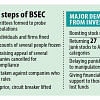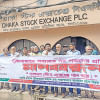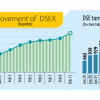Bangladesh stock market: Analysing the challenges ahead

The Bangladesh stock (equity) market has experienced significant fluctuations since the 2010 market crash, reflecting a challenging macroeconomic and political environment. Analysing the post-crash period from 2011 onwards provides insights into the volatility and recovery patterns of the market.
In 2011, the market experienced a dramatic loss of 32.2 percent (total return), driven by a sharp capital loss of 36.6 percent following the speculative bubble that burst in late 2010. This was compounded by high inflation (10.7 percent), leading to a substantial negative real return of 42.9 percent. Investor confidence remained low in 2012, with a further decline in market returns (by 16.1 percent) and inflation staying elevated (8.7 percent), resulting in another negative real return of 24.9 percent.
However, the market began to stabilise from 2013 onwards. Although capital gains were modest at 4 percent, dividend yields provided some cushion, and total market return rose to 7.8 percent. With inflation beginning to taper (7.5 percent), the real return turned positive at 0.3 percent, signalling a tentative recovery. From 2014 to 2017, the market gradually improved, with total returns averaging around 15 percent per year. The highest total return during this period was 26.7 percent in 2017, despite inflation averaging around 5-7 percent, leading to consistent positive real returns.
A major setback occurred in 2018 when the market saw a loss of 10.8 percent (total return), coupled with inflation at 5.7 percent, resulting in a negative real return of 16.4 percent. This trend continued into 2019 as the market struggled to recover, with a further 13.1 percent decline in total return. The market showed a sharp recovery in 2020 and 2021, with total returns of 24.4 percent and 29.1 percent, respectively, as post-pandemic optimism boosted performance. However, high inflation and corporate-led corruption have led to a decline in 2022 and 2023, and in 2024 YTD, the market is down by 16.2 percent (capital loss), facing significant headwinds like macro instability, high inflation, and weak investor sentiment.
The overall post-crash analysis shows a pattern of recovery but is marked by periods of volatility, inflationary pressure, and ongoing political and economic risks.
The Bangladesh stock market typically rebounds after 2-3 consecutive years of correction, as historical patterns suggest. Based on past trends, one might expect a recovery in or by 2025. However, the current situation presents unique challenges, as the market's trajectory is increasingly intertwined with the country's macroeconomic conditions and political landscape. Given these dynamics, the projection for the next two years remains cautious. The Bangladesh stock market is poised to encounter substantial headwinds due to a confluence of macroeconomic and political uncertainties, which could significantly impact its performance. Below is a detailed analysis of the key challenges expected to shape market outcomes in the coming years. To provide a more comprehensive understanding, the article includes historical context that sheds light on the underlying causes of anxiety among minority investors in Bangladesh's stock market, ensuring these issues are neither overlooked nor ignored.
Bangladesh's stock market is under strain as high interest rates on government bonds (11-13 percent) pull institutional investors toward safer, risk-free returns, weakening liquidity and investor confidence. Rising inflation, projected to hover around 10 percent for at least the next two years, exacerbates economic instability by eroding consumer purchasing power and corporate profitability while also increasing borrowing costs. Additionally, declining foreign exchange (FX) reserves, driven by reduced export competitiveness, supply chain disruptions, and rising business costs, further undermine economic stability. The weakening taka adds to the strain, raising import prices, feeding inflation, and deterring foreign investment due to the risk of currency losses. Compounding these challenges is Bangladesh's rising foreign debt burden, which is becoming increasingly expensive to service due to the taka's depreciation, diverting resources away from critical development projects and infrastructure investments. Without effective fiscal management, investor confidence and stock market growth are likely to remain subdued.
High global interest rates, particularly in the US, are drawing investment flows away from emerging markets like Bangladesh. With US bonds offering safer, more attractive returns, foreign investors are less likely to invest in Bangladesh's stock market, exacerbating capital outflows. Additionally, capital flight driven by export-import manipulation and corruption in large project financing, involving major corporations like S Alam Group, Summit Group, and BEXIMCO Group, continues to deplete foreign exchange reserves. Hopes of recovering these siphoned funds are unrealistic, as they are often held in tax havens with little incentive to cooperate. This capital flight and lack of international legal recourse further weaken the country's economic stability and stock market performance.
Bangladesh's stock market faces significant challenges due to weak regulatory leadership, institutional failures, and unresolved margin loan issues. The Bangladesh Securities and Exchange Commission (BSEC) remains under scrutiny. Compounding these concerns, the Investment Corporation of Bangladesh (ICB), once a major stabilising force in the market, is now struggling under a portfolio of junk stocks and questionable investments.
Years of mismanagement and corruption, including dubious investments have left ICB in a weakened financial state, severely limiting its ability to intervene in market downturns. Moreover, the persistent issue of margin loans continues to burden financial institutions. Merchant banks and brokerage firms, plagued by bad debts from margin loans extended during previous market bubbles, are unable to provide fresh loans, stifling market liquidity. The total outstanding margin loans, including interest, have reached Tk 250 billion ($2 billion), with a significant portion in negative equity. Despite efforts to address these issues, powerful individuals with political and social connections have manipulated the system, obtaining unauthorised loans and evading accountability. Without decisive action from the BSEC and a comprehensive cleanup of financial institutions' balance sheets, Bangladesh's stock market will remain vulnerable, limiting its growth potential and undermining investor confidence.
Bangladesh's stock market is grappling with a significant lack of "smart capital," as wealthy investors and corporations either move funds abroad or hold back investments due to uncertainty. This absence of new, well-capitalised investors leaves the market dependent on a small group of players, increasing the risk of manipulation and volatility. Foreign investors, too, are deterred by poor transparency, particularly under the previous leadership of the BSEC, further stalling capital inflows. Additionally, tax policies provide little incentive for companies to list on the stock exchanges, with the tax differential between listed and non-listed firms being too narrow to justify the costs of going public. As a result, many well-established companies avoid the stock market, depriving it of the quality listings needed for growth and stability. Combined with the regulatory failures that allow debt-ridden companies to remain listed, these factors prevent the market from attracting both local and international long-term investors, ultimately stifling its development. Without reforms, the Bangladesh stock market will struggle to achieve sustainable growth and liquidity.
Given these challenges, a conservative investment strategy focusing on government bonds is advisable. Allocating 60-70 percent of funds to government bonds ensures capital preservation in uncertain times. Until a stable government is established and market conditions improve, focusing on low-risk investments is a prudent approach. It's important to remember that in a stormy sea, keeping your ship steady is far more vital than rushing toward the horizon. In such dangerous waters, ensuring your vessel stays afloat matters more than chasing quick profits.
Mehedee Hasan is a freelance analyst with an MSc in Finance, Investment and Risk from the University of Kent, England. He can be reached at [email protected].
Views expressed in this article are the author's own.
Follow The Daily Star Opinion on Facebook for the latest opinions, commentaries and analyses by experts and professionals. To contribute your article or letter to The Daily Star Opinion, see our guidelines for submission.

 For all latest news, follow The Daily Star's Google News channel.
For all latest news, follow The Daily Star's Google News channel. 







Comments